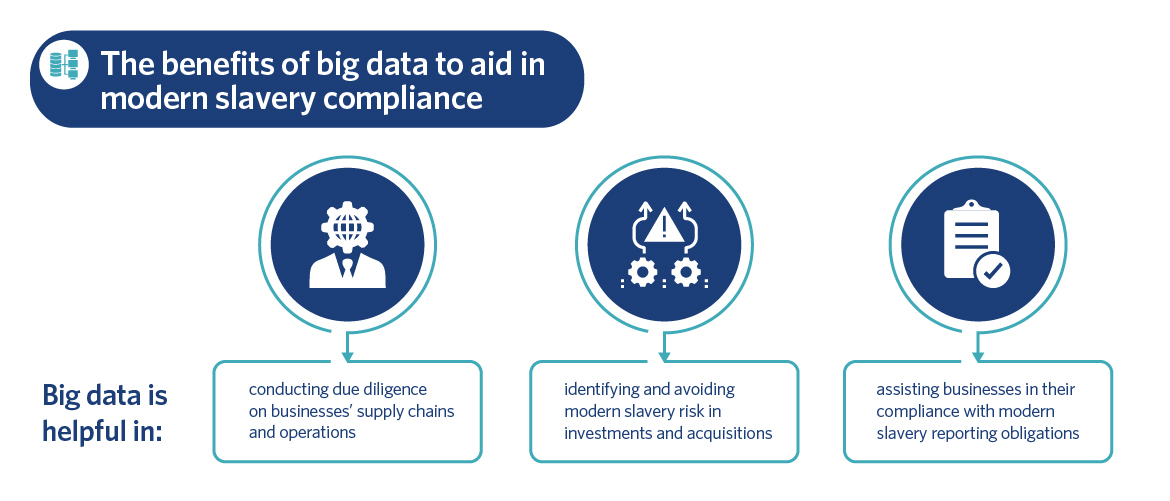Stay in the know
We’ll send you the latest insights and briefings tailored to your needs
Data analysis can only get you so far in modern slavery compliance… and regulators are watching
While the benefits of data and technology can be leveraged to aid businesses with modern slavery compliance and due diligence, businesses should not lose sight of the risks involved with overreliance on these tools. Despite the promise of more informed decision making, big data is not without its dangers, particularly if it raises red flags which are not acted on, or if real-life red flags are ignored.
There are practical limitations to the situations in which data can improve decision making, as well as regulatory and other legal risks associated with the collection and retention of data which may lead a business to suspect misconduct in its own operations or by suppliers.
Third party providers are actively aggregating data to sell to corporates in aid of their due diligence efforts. Risk and compliance databases and analytical tools are now big business.

Advances in technology give businesses the opportunity to mine data, such as their supplier records, to look for outliers which may raise red flags. For example, a bidder quoting a substantially lower price than others might imply a risk of underpayment or excessive working hours.
Sophisticated vendor management systems allow analysis and monitoring in a way never previously possible across large datasets. As well as having data on input costs and overheads in the supply chain, purchasers may have access to payroll records and information such as hours worked, sometimes as granular as hours worked by individual employees.
Even with those advances in the data held within organisations, corporates are also recognising the power of sector-wide data, banding together to explore through collective action how they can leverage their data and information to inform risk management decisions. Examples include the work of banks to understand and share typologies of transactions that involve risk factors for modern slavery and human trafficking.

Access to big data also presents risks for businesses.
First, big data is not necessarily good data. Businesses still need to actively assess the quality and currency of data they are accessing – whether through their own due diligence or via third party providers. The absence of a “hit” when undertaking a red flag search is not a reliable risk indicator if the data set did not include relevant information sources.
Regulators have also made clear that businesses cannot completely outsource the fulfilment of their obligations in this respect: data is only a tool to facilitate, rather than a substitution for, due diligence.
Businesses still need to actively digest the data and other information they collect or access to assess the implications for their businesses and their dealings (whether procurement or investment). In most cases, a human still needs to make a decision on what the data means.
As businesses move to collect and store greater volumes of data through due diligence or audits of suppliers and other counterparties, they should also recognise that they assume responsibility (in a regulator’s mind) for having assessed and responded to information contained in that data.
Regulators are increasingly likely to seek access to data in the context of investigations and prosecutions. If data held by an organisation gives rise to a suspicion that a supplier is engaged in modern slavery, procuring from that supplier may expose the organisation, executives or directors to serious questions from regulators.
If suspicions have not been acted on, this may raise questions about potential criminal liability for complicity in the underlying offending, as well as creating a risk of prosecution for dealing with the proceeds of crime.
Increasing reliance on data may also lead to centralisation of the human expertise required to interpret that data. While centralisation of supply chain risk management functions presents the potential for efficiency gains, businesses should ensure that front-line personnel dealing with suppliers (and not just centralised procurement teams) receive training on modern slavery risks in order that they are empowered to identify and act on real-life red flags which may not be present in digital data sets.
Supply chain due diligence during the COVID-19 crisisThe COVID-19 crisis has caused massive disruption to global supply chains. In a number of instances, the pandemic is also putting parts of the supply chain under huge pressure, in particular as a result of huge demand for pharmaceuticals and medical equipment. Travel and movement restrictions may create difficulties for conducting “on-the-ground” due diligence and businesses may need to rely more on remotely gathered data, or data gathered by third parties. The risk of modern slavery has meanwhile not gone away, and in some areas may have increased as a result of the crisis. In this environment, it is even more important to ensure adequate due diligence – using big data tools as one part of a considered approach. |
The contents of this publication are for reference purposes only and may not be current as at the date of accessing this publication. They do not constitute legal advice and should not be relied upon as such. Specific legal advice about your specific circumstances should always be sought separately before taking any action based on this publication.
© Herbert Smith Freehills 2025
We’ll send you the latest insights and briefings tailored to your needs